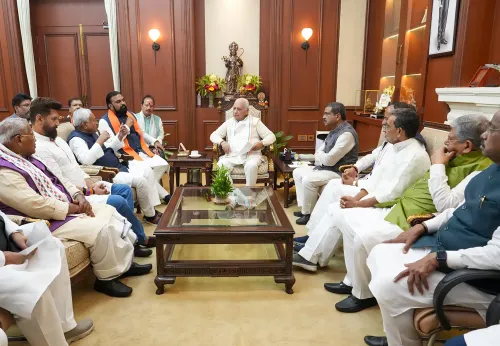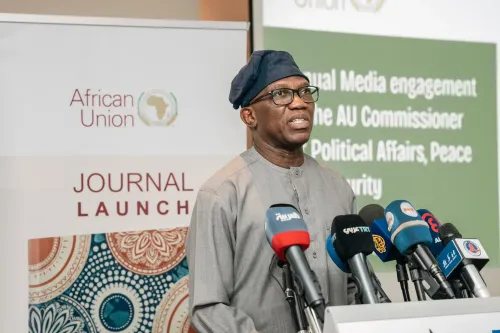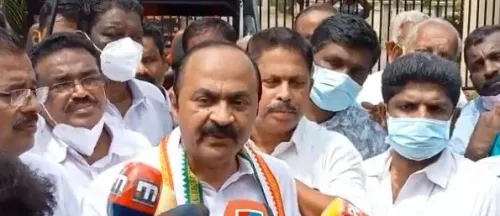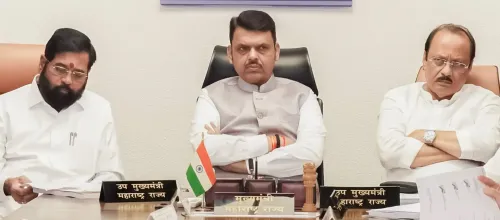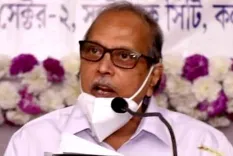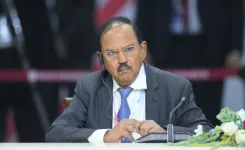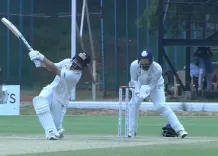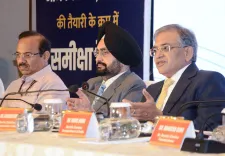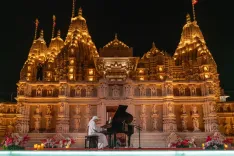Can Dalits Join BJP-RSS Without Congress Intervention?

Synopsis
Key Takeaways
- Siddaramaiah's stance on Dalit political choices.
- Importance of the Havanur Report in backward class politics.
- Recognition of the caste system's impact on society.
- Call for enhanced reservations for marginalized communities.
- Connection between political challenges and personal experiences.
Bengaluru, Nov 19 (NationPress) In a recent statement, Karnataka Chief Minister Siddaramaiah emphasized that the Congress party cannot prevent Dalits from aligning with the BJP or the RSS. He pointed out that many individuals from predominantly backward communities face death under the guise of religious beliefs.
“What can we do if the backward classes and Dalits, who see the BJP-RSS-ABVP as their opponents, still choose to join them? Even when they recognize that the BJP-RSS ideology is against their interests, they still turn to them. What can we do?” he remarked during the launch of the ‘L.G. Havanur Report Golden Jubilee’, an event organized by the Karnataka State Backward Classes Federation at the Jnanajyothi Auditorium in Bengaluru.
Siddaramaiah noted that those who perish in the name of religion are primarily from backward communities, stating that out of personal gain, they associate with the BJP-RSS and sometimes express views that are even more fervent than original RSS leaders like Hedgewar.
He reminded the audience that the late Chief Minister D. Devaraja Urs referred to the Havanur Report as the “Bible for backward classes” and acknowledged that the Supreme Court has commended the report.
Siddaramaiah shared the story of Havanur, who came from a modest Scheduled Caste family, mentioning his history of activism as a student and his achievement of being the first lawyer from his community.
The Chief Minister recalled a past media remark during his time as Finance Minister: “Will this Siddaramaiah be able to count 100 sheep in the budget?”
He accepted it as a challenge, having presented 16 budgets and currently preparing for the 17th. He highlighted the importance of opportunity for marginalized communities.
He underscored Havanur's legacy as someone from the Beda caste, illustrating that talent emerges when given a chance. “Talent is not exclusive; it flourishes when opportunities are provided,” Siddaramaiah stated.
He also reflected on his loss in the 1991 Lok Sabha elections, noting Havanur's support during a related legal matter, which fortified their friendship.
Siddaramaiah invoked B.R. Ambedkar, asserting that as long as the caste system persists, reservations are necessary.
“Despite 68% of our population being from backward communities, the caste system remains deeply rooted. Those benefiting from it only reinforce its existence. Many backward communities have yet to abandon a servile mentality. Referring to upper castes in plural and lower castes in singular exemplifies a mindset of servitude,” he commented.
He remarked that even well-educated individuals from backward communities often cling to superstitions, equating poverty to destiny.
“Likewise, educated members of marginalized groups continue to hold on to superstitions,” he said.
The Chief Minister concluded by stating that both Buddha, Basavanna, and Ambedkar fought against the caste system.
“When they struggled, it appeared the system was loosening, but it has since tightened again. The caste system is not disappearing,” he remarked.
Siddaramaiah asserted that his administration is prepared to implement reservations based on economic, social, and educational reports and aims to raise the reservation cap to 70–75%.
He added that Rahul Gandhi has advocated for a caste census due to his ideological beliefs.
During his address, Siddaramaiah also recited passages from the Manusmriti that discriminate against the Shudra community.

